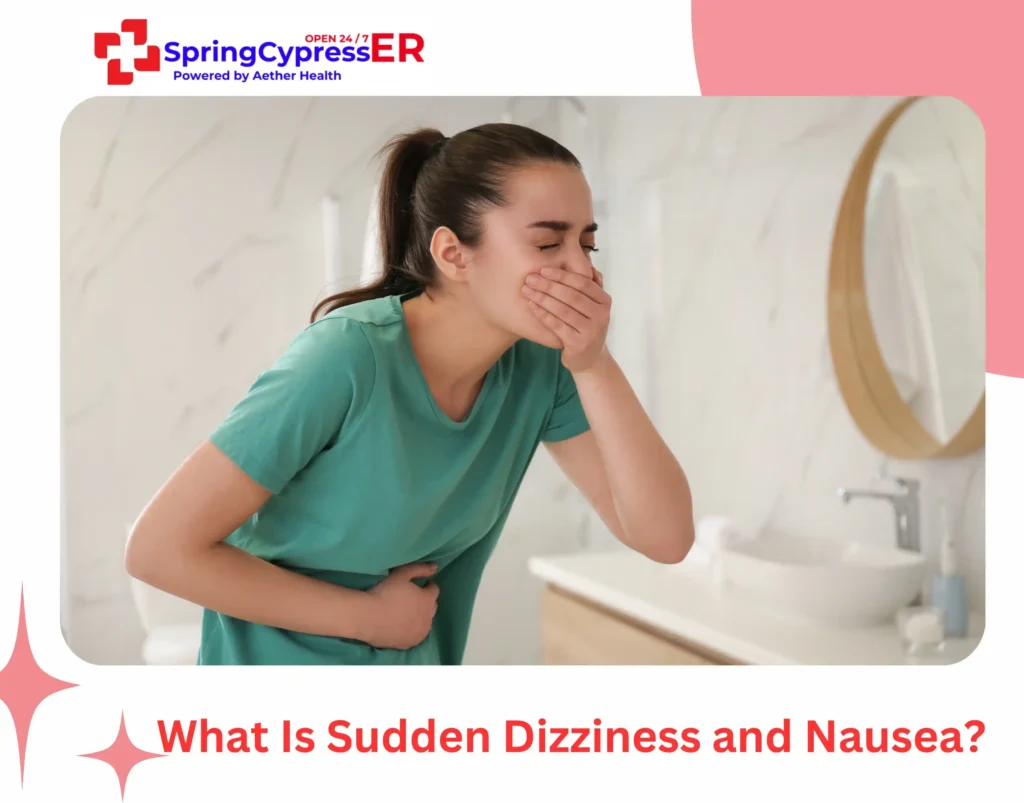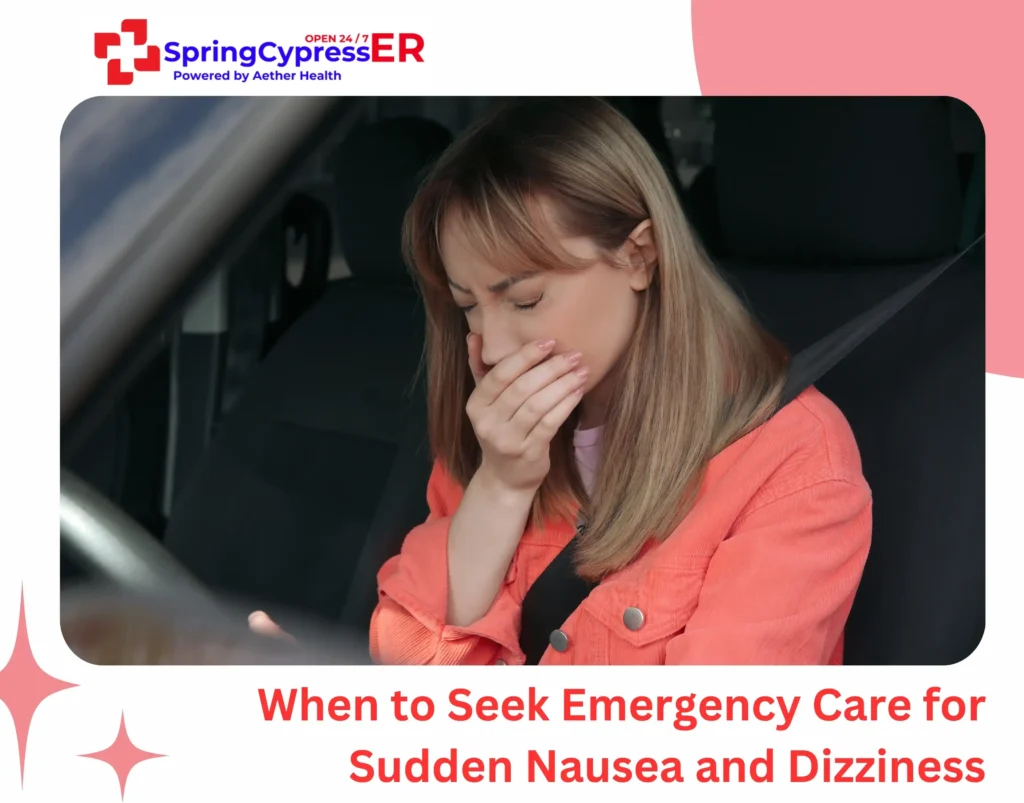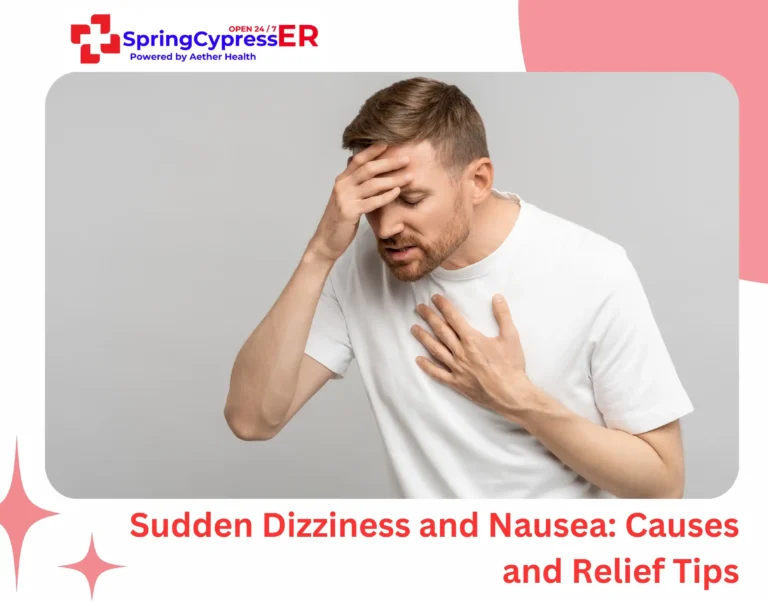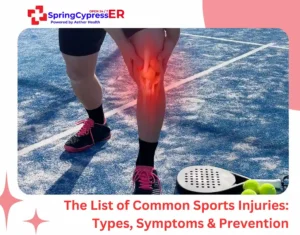Would you ignore a stroke, heart problem, or inner ear issue? Of course not. That’s what sudden dizziness and nausea might be signaling.
Knowing the causes behind dizziness and nausea can help you decide whether basic fixes like hydrating or resting will help, or if it’s serious enough to see a doctor.
So, let’s break down why this happens and what you can do to feel better. We’ll also include other symptoms for each cause to help you better understand your situation without assuming every dizzy spell is dangerous.
What Is Sudden Dizziness and Nausea?

Sudden dizziness and nausea are the symptoms (not illnesses on their own) that often appear together. You feel unsteady and sick to your stomach at the same time.
- Dizziness feels like the room is spinning, your head is light, or you may lose your balance.
- Nausea is that queasy, upset stomach feeling that you may vomit.
When they happen together, it’s your body’s signal that something’s wrong.
10 Common Causes of Sudden Dizziness and Nausea
Dizziness and nausea can be triggered by a wide range of conditions, from mild dehydration to more serious medical issues. Let’s have a look at some common reasons.
1. Benign Paroxysmal Positional Vertigo (BPPV)
There are small stones (otoconia) in your inner ear that help you maintain your balance while moving. BPPV is a condition in which these stones become dislodged and start moving freely within the ear. As a result, you begin to lose your balance, resulting in feeling dizzy and nauseous.
Other Symptoms:
- Spinning sensation triggered by certain head movements
- Unsteady walking
- Brief episodes (usually last less than a minute)
- No hearing loss or ear pain (unlike other ear issues)
2. Low Blood Sugar
Low blood glucose levels, or hypoglycemia, occur when your glucose levels drop to unhealthy levels, that is, below 70 mg/dL. It is usually found in patients with type 1 and type 2 diabetes who are on insulin or oral hypoglycemic drugs.
Other Symptoms:
- Shaky hands
- Sweating (cold, clammy skin)
- Rapid heartbeat (tachycardia)
- Confusion or trouble focusing
- Sudden hunger
- Pale skin
- Weakness
3. Dehydration and Electrolyte Imbalance
Dehydration and loss of electrolyte balance are one of the most widespread causes of dizziness, along with nausea. Both can impair your body’s ability to function properly, affecting the brain, nerve endings, blood flow, and muscle control.
Dehydration leads to a drop in blood volume, which in turn reduces the oxygen and nutrient supply reaching the brain, making you feel lightheaded and nauseous.
Other Symptoms:
- Dry mouth and extreme thirst
- Fatigue or weakness
- Dark yellow urine or decreased urination
- Muscle cramps or twitching
- Headache
- Disorientation or confusion
- Fainting (in severe cases)
- Rapid breathing or heartbeat
4. Anxiety and Panic Attacks
Intense fear or emotional distress can also make you feel dizzy and nauseous. During panic attacks, the “fight or flight” mechanism is triggered, which releases the adrenaline hormone. It causes an increased heart rate and respiratory issues, resulting in dizziness and lightheadedness.
Other Symptoms:
- Chest pain
- Fast, shallow breathing (hyperventilation)
- Racing heartbeat
- Sweating
- Trembling
- Feeling detached from surroundings (derealization)
- Fear of losing control or dying
- Tingling or numbness in hands and feet
5. Low Blood Pressure
If the blood pressure drops below the required level, it can impair blood circulation to vital organs. Commonly affected organs include the brain and the digestive system, resulting in symptoms such as sudden dizziness and nausea.
Other Symptoms:
- Blurred or tunnel vision
- Cold, pale, or clammy skin
- Weakness or fatigue
- Confusion
- Fainting
- Shallow breathing
- Feeling unusually tired
6. Motion Sickness
This happens when your inner ear senses motion that your eyes don’t. For example, your eyes may perceive a fixed surrounding, such as when you are looking out the window of a vehicle whereas your inner ear, which aids with balance, detects motion.
This discrepancy between what is perceived by the inner ear and the eyes creates confusion in the brain, resulting in dizziness and nausea.
Other Symptoms:
- Vomiting
- Cold sweats
- Headache
- Increased salivation (mouth watering)
- Pale skin
- Feeling tired after the motion stops
7. Medications or Side Effects
Some medications (like blood pressure medicines, antidepressants, or antibiotics) can cause sudden dizziness and nausea as side effects, especially when your body is adjusting to them.
Other Symptoms:
- Fatigue or drowsiness
- Headaches
- Dry mouth
- Diarrhea or constipation
- Low blood pressure
- Changes in appetite or weight
- Mood changes (like anxiety or irritability)
- Allergic reactions (rash, itching, swelling in rare cases)
Note: Symptoms vary depending on the specific medication.
8. Pregnancy (Morning Sickness)
Sudden dizziness and nausea are common symptoms in pregnancy, often linked to hormonal changes and physiological adjustments. These symptoms can be more pronounced during the first trimester.
Other Symptoms:
- Missed period
- Tender or swollen breasts
- Increased urination
- Fatigue or exhaustion
- Food aversions or cravings
- Metallic taste in the mouth
- Mild cramping (without bleeding)
- Mood swings
- Heightened sense of smell
9. Stroke
In rare cases, dizziness and nausea could be signs of a stroke.
Other Symptoms:
- Sudden numbness or weakness, especially on one side of the face, arm, or leg
- Drooping on one side of the face
- Slurred speech or trouble understanding others
- Blurred, double vision, or sudden loss of vision
- Severe, sudden headache
- Loss of coordination
- Trouble swallowing
Important: If someone has any of the above signs, call emergency help immediately. A stroke needs treatment within hours to prevent brain damage.
10. Heart Problems
Certain heart issues like a heart attack, arrhythmia, or heart failure can cause dizziness and nausea due to poor blood flow or oxygen supply.
Other Symptoms:
- Chest pain
- Pain radiating to the jaw, neck, back, or arms
- Shortness of breath
- Cold sweats
- Lightheadedness that feels like you might faint
- Rapid or irregular heartbeat (palpitations)
- Unexplained fatigue or weakness
- Anxiety or a sense of doom (in heart attacks)
Important: If dizziness and nausea are sudden and accompanied by chest discomfort or trouble breathing, don’t wait. It could be a heart attack.
When to Seek Emergency Care for Sudden Nausea and Dizziness

While sudden dizziness and nausea often resolve with basic care, certain warning signs indicate serious medical emergencies requiring immediate attention.
Seek emergency care immediately if you experience chest pain, shortness of breath, or pressure alongside your dizziness and nausea. These symptoms may signal heart problems that need urgent treatment. Similarly, sudden severe headache unlike any previous headache, especially with vision changes or slurred speech, could indicate a stroke.
Call 911 if you notice:
- Weakness or numbness affecting one side of your body
- Difficulty speaking or understanding speech
- High fever with neck stiffness
- Fainting or loss of consciousness
Get medical evaluation when symptoms persist beyond 24 hours without improvement, worsen despite rest and hydration, or keep recurring without clear causes. This is especially important if you have diabetes, heart conditions, or take blood pressure medications.
For Pregnant Women
Pregnant women need prompt attention for severe nausea that prevents keeping fluids down, as dehydration poses risks to both mother and baby. Additionally, dizziness combined with vaginal bleeding or severe cramping requires immediate evaluation.
Get immediate care for:
- Recurring episodes without clear triggers
- Falls or injuries caused by severe dizziness
- Inability to perform daily activities due to symptoms
Your body sends clear signals when something requires urgent attention. If symptoms feel different from typical episodes or instinctively seem serious, don’t delay seeking emergency care. At ER of Spring Cypress, our medical team provides rapid evaluation and treatment for patients experiencing dizziness and nausea symptoms.
How to Relieve Sudden Dizziness and Nausea

Managing sudden dizziness and nausea effectively often involves a combination of home remedies, lifestyle adjustments, and, when appropriate, medications. Here’s what you can do for sudden dizziness and nausea relief:
- Avoid making rapid head movements: Particularly if the inner ear problems are the cause such as benign paroxysmal positional vertigo (BPPV).
- Stay hydrated: Keep a water bottle with you, and sip water throughout the day.
- Don’t skip meals: Small, balanced snacks maintain your blood sugar levels.
- Try natural remedies for nausea: such as aromatherapy or tea infused with peppermint or ginger can reduce nausea naturally and work within 30 minutes.
- Physical therapy techniques for inner ear disorders: For instance, Epley’s Maneuver, performed by a trained clinician, can provide quick relief from vertigo.
- Avoid triggers and stress: They may exacerbate your pre-existing symptoms.
- Practice relaxation techniques: Such as deep breathing exercises, to alleviate symptoms.
- Limit screen time: Scrolling your phone or watching TV when you’re dizzy can make things worse. Rest your eyes and brain for a while.
- See a specialist: If dizziness and nausea are frequent you should go to the nearest emergency room for a professional checkup.
Final Thoughts
Sudden dizziness and nausea can be distressing, but understanding the underlying causes and how to manage them can help you stay calm. While many cases aren’t severe and can be managed at home, some symptoms may indicate deeper health concerns. A professional checkup is the only way to treat the underlying cause and help prevent future episodes.
If you see any red flags, such as chest pain or mental fog, don’t wait. Visit ER of Spring Cypress. We provide fast stabilization through IV treatment and use our onsite imaging to quickly identify what’s causing your symptoms.
FAQs
1. Can sudden dizziness and nausea happen without any obvious reason?
Yes. Sometimes, your body can react to minor changes like sudden movements, temperature shifts, or skipped meals without you realizing it. However, repeated unexplained episodes should be checked by a doctor.
2. How long do episodes of sudden dizziness and nausea usually last?
It depends on the cause. For example, low blood sugar symptoms may ease within 10–15 minutes after eating, while vertigo episodes can last seconds to minutes.
3. Are over-the-counter medications safe for sudden nausea and dizziness?
In mild cases, yes. Anti-nausea medications like meclizine or dimenhydrinate (Dramamine) can help with motion sickness or vertigo. But if symptoms are new, unexplained, or frequent, avoid self-treating without a doctor’s advice.
4. How do ER Spring Cypress figure out the cause of dizziness and nausea?
At ER Spring, the doctors assess your medical history, check your vital signs, and may order blood tests, ECGs, or imaging like CT scans or MRIs. They also examine your ears, eyes, and neurological function to pinpoint the exact cause.
5. When should I worry about dizziness and nausea?
If your dizziness and nausea come on suddenly with chest pain, trouble breathing, confusion, vision issues, or fainting, treat it as an emergency.




